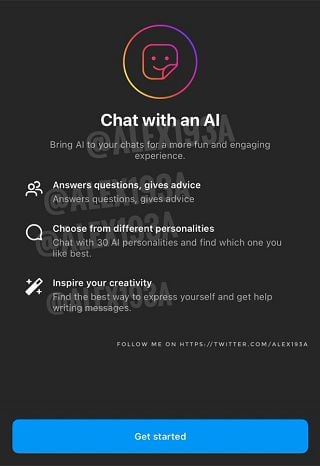Is anybody else disappointed at the lack of interesting, innovative generative AI tools being rolled out by social apps?
Generative AI is being hailed as a milestone achievement, a turning point in tech, and something that’s set to revolutionize entire industries. Yet, social media apps have thus far struggled to expand beyond visual effects and chatbots, with the latter also running somewhat counter to the whole concept of “social” media. Right?
Regardless, that’s seemingly what we’re getting, with Instagram soon to become the latest app to integrate its own AI chatbot option, with the twist in this case being that the bots will be available in different personas, so you can customize your artificial engagement.
And they’re likely coming this week. As reported by The Wall Street Journal, Meta’s AI chatbots look set to be one of the showcase elements of Meta’s “Connect” conference, which is being held in Menlo Park on Wednesday.
As per WSJ:
“Meta Platforms is planning to release artificial intelligence chatbots as soon as this week with distinct personalities across its social-media apps as a way to attract young users, according to people familiar with the matter.”
How attractive they’ll actually be to young users remains to be seen, but Meta is apparently of the belief that chatbots which answer back in character will be a cool novelty that will drive more take up and interest.
The plan has actually been in the works for some time, with reverse engineers uncovering details relating to Meta’s AI personas in the back-end code of Instagram back in July.

As you can see in this screenshot, shared by app researcher Alessandro Paluzzi, Meta’s AI chatbots are set to have up to 30 different personalities to choose from, so you can engage with a bot that talks like a surfer dude, or Abraham Lincoln, as a more fun way to interact.
According to WSJ, other Meta chatbot personalities will include a “sassy robot” persona, which will provide answers in a similar delivery style to Bender from the cartoon series “Futurama”, while another will be “Alvin the Alien”, which seems vaguely modeled on “Marvin the Martian” from Bugs Bunny cartoons.
These are just a few of the many personalities Meta plans to include, while it’s also planning to build a chatbot creation tool, so that celebrities, and maybe even regular people at some stage, can create a chatbot in their own persona and delivery style.
Which seems completely safe and free of risk. Creating automated bots that provide answers that sound like a celebrity totally won’t lead to people re-sharing those quotes, and trying to palm them off as being legitimate statements. Should be fine.
Again, Meta’s been working on this for months, and is even looking to extend bots to more specialized, dedicated areas, like coding for example, via custom LLMs that are aligned with specific use cases. And while that is definitely a big area of potential, I don’t see character-aligned bots being a big winner, and driving any significant engagement in its apps.
Because while it is an interesting novelty, it wears off pretty quick. There are actually several bots already available along these lines, like “ChatShitGPT”, which provides semi-abusive replies to your questions via WhatsApp.
Which is funny, and entertaining to go back to every now and then. But it’s not like it changes the process. And while getting jokey answers is a humorous thing to show off to friends, really, the value of chatbots is in providing actual answers to your actual queries, and getting those responses in the stylings of historical figures or wrestlers just isn’t that additive, or engaging.
But maybe this is actually the point. Maybe, by getting people to share examples of these responses with friends, that’ll help to raise awareness of Meta’s chatbot tools more broadly, and get more people using them, simply by being made aware that they exist. Maybe, in this sense, the personas element is just a vehicle to get people talking, and that’ll eventually lead to more AI chatbot usage in its apps, as opposed to people opening up the separate ChatGPT app for the same.
Meta’s also building its own LLM to compete with OpenAI, the maker of ChatGPT, and maybe this is a means to raise awareness of its own advancing AI tools, in order to keep people in its apps, as opposed to drifting off to others.
In that sense, this could actually be a very clever play. Snapchat, for example, drives significant usage through sharing of its AR Lenses, and people then coming to the app to try them out for themselves.
Maybe, this is more of a promotional tool than anything, and Meta’s simply looking to boost awareness through these gimmicky bots.
Whatever the reason, it is indeed a gimmick, and gimmicks are generally short-lived. Meta knows this, of course, and it would surprise me, in this context, if it really saw these chatbot personas as a long-term driver of engagement.
But then again, maybe there’s also more to it than it seems.
We’ll find out, with Meta set to announce the chatbots at its Connect conference this week.



